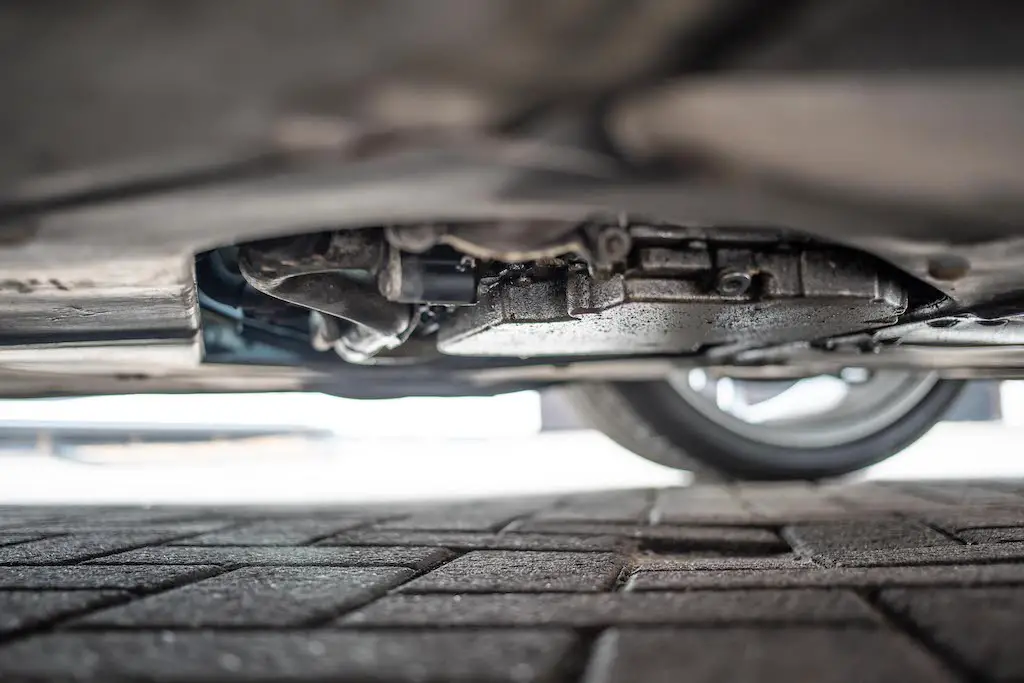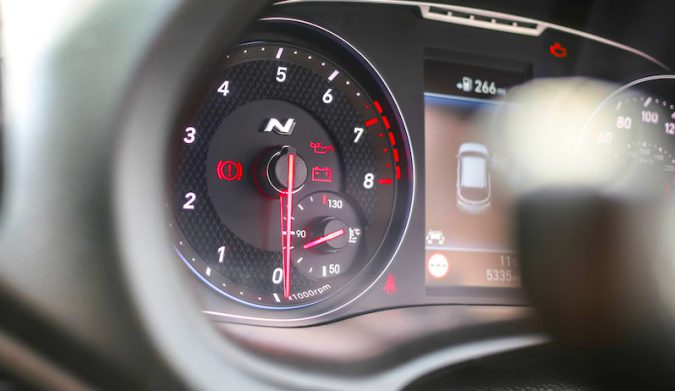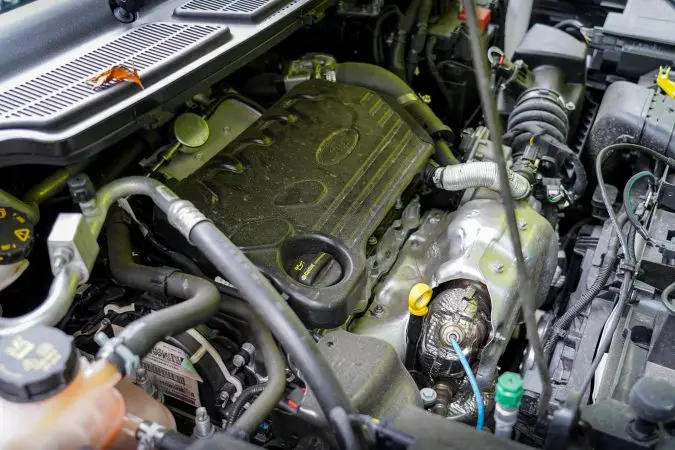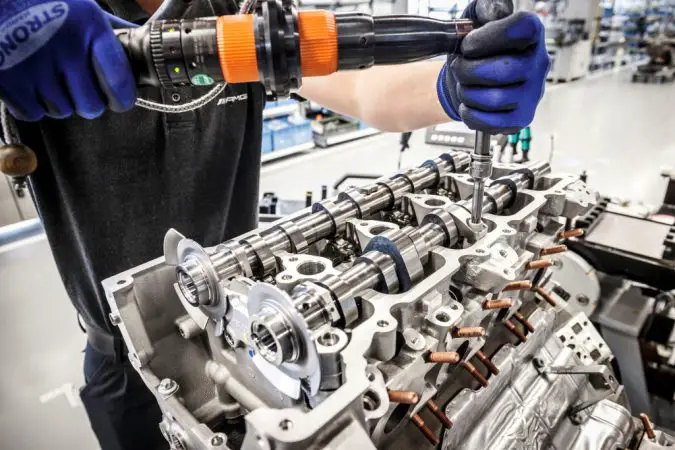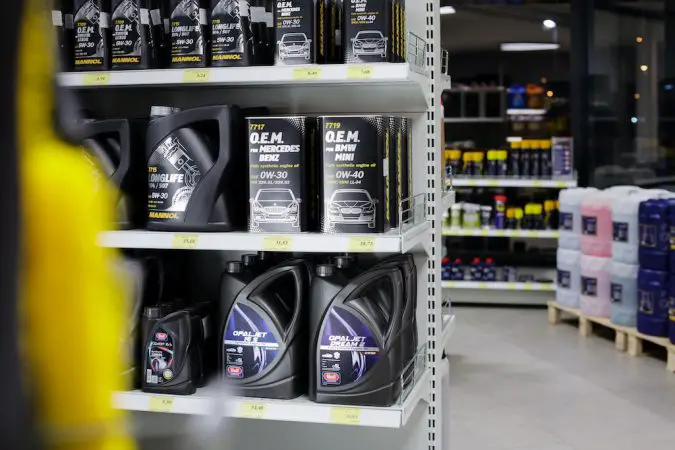There aren’t that many things that could so very easily make your heart sink to the floor like walking up to your car and noticing an oil leak underneath. The size of the stain itself is directly proportional to how annoyed you’ll feel afterward. Your car soiling itself into a big brown puddle isn’t something to gloss over, however. Although there are more expensive problems to be had within an automobile, a slight oil leak could sooner or later snowball into even bigger headaches.
Within your car’s engine, there are a plethora of mechanical bits and pieces that need to work with one another. These moving parts create a lot of friction as they rub against each other, just to make the engine run. This is where the oil comes in, as a lubricating fluid to keep them from wearing other parts down. It also works to prevent corrosion, and in moderating the heat between those many moving parts. Suffice to say, that golden liquid is very important.
Without oil, your engine would wear itself down within the blink of an eye. It’s for that reason why an issue as seemingly simple as a few drops of an oil leak shouldn’t be ignored. But before we start panicking over having to mortgage your house, we can be thankful that this can be fixed. But why is it happening in the first place? How do I fix them, and how much is it going to cost me? Could I drive while it’s still leaking? Our engine oil leak will unravel some of these questions.
Oil Leak Symptoms
First and foremost, we’ll need to make sure that you’re actually leaking engine oil. Now, this might sound like a silly question, because you’re probably staring at a puddle under your car right now. However, before you bonk me in the head for pointing out the already obvious, there are more clear signs of an oil leak other than just smudges on the ground. In fact, some symptoms of leaks are far more sneaky and could be more serious than others.
1. Oil Puddles Underneath Your Car
Of course, this is the most obvious sign to know if your car’s engine is leaking. Although, make sure that you pay close attention to the color of the leak itself. Note that there are many other types of fluids within a car other than your engine oil. These liquids, just like oil, are important in working with your car’s mechanical components to ensure friction-less and cool operation. Some are needed in the core function of those particular parts, such as transferring hydraulic pressure.
Engine oil is typically a brown color, which starts out more gold or amber, but turns darker as it ages. Transmission fluid, as well as power steering fluid, are of a reddish or red-brown hue. Brake fluid is also of a pale brown shade. Meanwhile, your car’s coolant can be in many different colors, such as blue, green, yellow, orange, or pink-purple in most cases. Knowing the color of the leak is important in narrowing down the problem, and deciding what needs to be fixed.
2. Low Oil Levels Or Oil Pressure Warning Light
Another way of checking for a car oil leak is the amount of engine oil itself that’s inside your car. Located near the engine, you can check the dipstick, and see if you have a sufficient level of oil. While you’re there, it might even be helpful to check the condition of the oil and see if you’ll be needing to have an oil change soon. If it’s too low, then clearly there’s a leak somewhere that you might’ve missed.
Another instance would be your car could also be flashing an ‘oil pressure’ warning light on your instrument cluster. Depending on your car, you might even have a separate oil pressure gauge. Note, however, that the ‘oil pressure’ warning indicator is separate from the ‘check engine’, or ‘service engine soon‘ lights. If you notice that oil pressure indicator, it could indicate that the level of oil in your car is low and that there’s very likely an oil leak somewhere.
3. Smoke Coming From The Engine Bay Or A Burnt Smell
There are occasions when an oil leak is not visible from underneath your car. In this instance, it might be leaking inside the engine compartment. When this happens, oil could leak onto hot components, such as the exhaust manifolds. The result is you seeing dark smoke emitting from under your hood, as the oil burns up from the heat. This is extremely dangerous, as it could cause a fire, or at the very least damaged parts of your car, such as the oxygen sensor, or gaskets.
You might also be able to notice this by listening for any sizzling or boiling sounds. This, once again, is an indication that a fluid – possibly the engine oil – is leaking onto a hot component of your car. Another possible cue for an oil leak is by a burning or a heaty smell. That ‘hot’ smell tells you that engine oil, or something else, is leaking onto a hot part of your car, and is starting to burn up. Alternatively, it could also be a sign that your car is overheating.
4. Engine Overheating
As we mentioned earlier, your engine oil does more than just lubrication to ensure minimal friction within your car’s motor. It also works to help moderate the heat. Your car has many moving parts, and all that friction will undoubtedly cause it to emit an immense amount of heat. If your car’s engine oil is low, it will cause more friction, and thus result in more heat being produced. If you notice that your car is overheating, it might point out that you have an oil leak.
5. Blue Smoke Coming From The Exhaust
Another sign of an oil leak and this is a much more serious one, is the sight of thick blue smoke coming from your exhaust pipes. This happens when your car’s engine oil happens to make its way directly into your car’s engine. When it drips into the combustion chamber, the oil will burn up. This won’t just emit blue smoke from the exhaust (or blue smoke from exhaust on startup), but could also leave a residue within your engine. This could, in time, cause the metal components to degrade, and lead to bigger problems.
Why Is My Car Leaking Oil
Now that we’ve learned more about how you can spot an oil leak, it would be helpful to try and narrow down what’s causing them in the first place. There are numerous causes on why your engine oil is leaking. Oftentimes, it could just be simple wear and tear, such as gaskets losing their seal. Sometimes, the causes could be far more serious, and thus will be more problematic to fix. Here are some of the more common causes that will lead to an oil leak.
1. Loose Oil Filler Cap
First off, let’s start with the simple ones. Perhaps the most innocent and least serious fault that’s resulting in your engine leaking oil is having a loose oil filler cap. This will cause the oil to leak out from the top of the reservoir while the engine is in use. Double-check your engine oil reservoir, and make sure the cap is tightened all the way. Otherwise, it might be that your oil filler cap is getting old or has broken, and can’t maintain a good seal. In this case, it will need a replacement.
2. Poorly Oil Filter
Another cause for an oil leak is a damaged, or rusty oil filter. The oil filter, as the name suggests, works to filter out contaminants from getting into the engine oil. Oftentimes, your car’s oil filter is replaced every time you schedule an oil change. Over time, the oil filter can wear down, get rusty, or get knocked off by vibrations from the engine. If this happens, the oil filter won’t be able to function properly and will result in contaminants getting into the engine oil.
It might also be caused by the O-rings around the oil filter wearing out. Although, the difficulty of replacing this often results in needing to replace the entire filter altogether. If the engine oil gets contaminated by dirt or debris, it can prematurely degrade gaskets and seals around the engine. It’s this contaminated oil that will eventually wear down those seals that keep it within its reservoir, which will then cause an oil leak to happen.
3. Worn Out Gaskets Or Seals
Aside from a faulty oil filter that needs changing, the gaskets or seals could naturally wear down on their own. Gaskets and seals are usually made from rubber, and they can harden and decompose over a period of time after being subjected to intense heat from the engine. Important gaskets around the engine include those around the valve cover at the top of the engine or the head gaskets. Seals can include the camshaft, or crankshaft seals, among others.
Worn-out seals or gaskets will eventually let oil flow, and leak through them. Other than heat or vibrations, seals or gaskets could also wear down due to the oil itself. Contaminated oil is one factor, as well as sludge. The latter is oil that hasn’t been changed in a while and has broken down into a gooey liquid. The build-up of viscous sludge can cause an increase of pressure around the gaskets and seals, thus causing them to wear out even faster, or fail outright.
4. Worn Out Drain Plug Or Damaged Oil Pan
As part of your car’s engine oil reservoir, the oil pan sits at the very bottom. As you drive along, your exposed oil pan can be subjected to damage, such as coming into contact with debris. It can puncture a hole straight through, or cause a crack in the oil pan. Alternatively, the oil pan itself could corrode over time due to weathering, and leave itself a small hole. Either way, it can cause the reservoir to start leaking engine oil.
Otherwise, it might be the drainage plug that has worn itself out. Your car’s drain plug is located at the very bottom of the oil pan. During oil changes, the drainage plug will work to flush out engine oil from the system. Usually, the oil plug seals are changed after every regular engine oil replacement. After a while, the seal around the drain plug can wear out or get damaged and will cause leakage. Or, perhaps the drain plug was left loose, which could also cause an oil leak.
5. Cracked Cylinder Head Or Engine Block
Now, we get to the most gut-wrenching cause that could result in an oil leak. This is not common, but it can happen under certain circumstances. This includes poor maintenance or running your engine under an immense amount of strain. For example, running the engine with constantly low coolant, letting it run hot, or driving without a sufficient amount of engine oil. These can cause the cylinder head, or more seriously, the engine block itself to crack.
When it does, it can cause the engine oil to start leaking. Either, the engine oil will leak into places where it shouldn’t be. One scenario would be the engine oil to leak into the cooling system, or into the combustion chamber. Otherwise, engine oil might spring a massive leak all over the engine bay. This is a complex, time-consuming, and very expensive problem to have fixed. In some cases, it might involve getting the whole engine replaced in its entirety.
Oil Leak Repair
Okay, so you’ve understood now that oil leaks can be fairly problematic. You might now be scratching your head trying to figure out ways to stop engine oil from leaking. More importantly, you might want to know how large of a hole it will burn through your pocket. Well as we’ve learned earlier on, some of the causes of leaking oil are fairly innocent. As such, they can be pretty inexpensive, and simple to fix even from home.
Although, it’s worth reminding you to double-check if these parts can fit your particular vehicle. If you’re in need of a new oil filler cap, you can find them for as little as $5, and most will be priced at less than $10. Replacing oil filters is also fairly cheap cost-wise, as you can find very good options on the market for less than $10 for the most part. Oil pan gaskets and seals are a much harder fix, but you can find them for around $20 to $30, while some can cost over $50.
If it’s the drain plug that needs replacing, then you could find those quite readily for less than $5. Or, if your oil pan has a puncture in it, you could try to use sealants to fill it up. Typically, gasket sealants can be used to fill out those tiny holes or small cracks. They can be found commonly for under $10, but more comprehensive sealants might cost around $15 or $20. Therefore, we can conclude that on average, most oil leak problems can be solved for around or under $100.
Oil Leak Repair Cost
However, not every single problem can be fixed so easily and cheaply. Some causes for oil leaking are more serious than others, and this will result in repair bills that could quickly run into four digits. If the oil pan has serious damage and cannot be sealed, it will need to be replaced fully. In general, the full replacement cost accounting for labor, can is anywhere between $500 and all the way upwards of $1,000. It’s worth mentioning that the costs will vary depending on your car.
A blown head gasket will be even more expensive to fix, with an average sticker price of between $1,000 to $2,000 for a replacement. For some models, such as heavy-duty pickup trucks or SUVs, you can even expect it to go upwards of $3,000. The most expensive potential problem to fix would be the engine block. We learned earlier that the engine block could crack under pressure. Normally, this will require a full replacement, not just a simple repair.
The price of a brand new engine block – and accounting for the cost of labor – varies hugely depending on the model. For more ordinary cars, you can expect a cost of anywhere from $2,500 to $5,000, based on the make and model. High-performance or luxury cars will be more expensive, costing anywhere from at least $5,000, all the way up and above $10,000. We recommend using sites such as YourMechanic to find a more accurate repair quote for your car.
Can You Drive A Car With An Oil Leak
You might now realize that your car is leaking engine oil, but it’s perhaps not all too serious. It might just be leaking a drop or two every minute or so, and you might just be tempted to press on, and fix this some other day. So, is it safe to drive a car is has sprung an oil leak? Simply put, maybe. We highly recommend getting it looked into, and fixed as soon as possible. This is simply down to the fact that leaking engine oil can cause serious problems if not settled right away.
If the oil leaks onto a hot component of your car, it’s now a possible fire hazard. Even if it doesn’t burst into flames, it will undoubtedly cause damage to other parts of your car. What was once a simple leak can sooner or later turn into a major repair. Plus, having slippery oil leaking away onto the road is also a major hazard. As slick as they are, the cars behind you can get your engine grease on their tires, which could result in them spinning out of control and causing an accident.
Therefore, we recommend driving your car with leaking oil only for emergencies. And, do this only if the leaking itself is not catastrophic, like a constant stream of oil pouring in from your engine. If this isn’t the case, it will be fairly safe to drive your car carefully and moderately for short distances. You can then use this opportunity to drive down to the nearest workshop or garage, and have your car checked out immediately.
What Causes Oil Leaks In A Car
Now distraught at seeing how disastrous and costly oil leaks can be to fix, you’re no doubt more cautious of wanting to make sure they don’t happen again in the future. But how could you prevent your engine oil from leaking? The best prevention method possible is to make sure you stay on top of your car’s regular servicing schedule. This doesn’t just apply to your engine oil, as every single piece of your car needs to be looked after and replaced now and then.
Each vehicle should have a recommended service interval. The engine oil needs to be changed after a number of miles, as it naturally degrades and wears down. Your oil filter needs to be replaced, as your gaskets and seals will also need to be checked on after a while. Making sure you send your car for its regular maintenance routine can do wonders at preventing the very problems that eventually spring up an oil leak.
You can also prolong the lifespan of gaskets and seals with certain types of engine oil. You should find out whether these motor oils are compatible with your particular car before mixing them in. These oils have special additives, or ‘stop leak’ features that could re-condition and heal your car’s gaskets and seals as the oil flows around. Using these alone won’t be able to fix a potential leak or poor seal, but it can help to prevent them from occurring in the near future.
Signs, Causes, and Prevention of Engine Oil Leaks
- Engine oil prevents friction in the engine, but over time it can become dirty and lose its viscosity, which leads to erosion and potential mechanical failures.
- One of the most typical signs of an oil leak is seeing a puddle of greasy-looking brown liquid under your car, but many cars today have shielding that may hide a leak, and in that case, a low oil level is a sign of leakage.
- An engine covered in oil and the smell of burnt oil are also signs of an oil leak.
- Oil leaks are caused by degraded engine gaskets or oil seals due to old, dirty oil, damaged oil gaskets or pans, incorrect installations, or bad rings or valve seals.
- It is urgent to stop an oil leak and take your vehicle to a mechanic immediately to prevent significant damage to your engine.
- The frequency of oil changes should be based on the manufacturer’s recommendations, which can be found in the owner’s manual, on the manufacturer’s website, or by calling the service desk at your local dealership.
- The recommended mileage for an oil change varies by car, and all cars are different. Also, check out our guide on why the check engine light comes on after an oil change.
- Changing your oil as recommended by the manufacturer is critical to preventing a major oil leak.
- Simply changing the oil will not fix an oil leak, and you should identify the cause of the leak, conduct the necessary repairs, and then, depending on how much oil you’ve lost, either top it off or have it changed.
- Although there are several products on the market targeting DIY leak stops, taking your car to a shop is the best course of action, as properly identifying the underlying cause is crucial.
Conclusion On Car Oil Leak
We can now conclude our engine oil leak guide, and we hope you’ve found it useful in your time of distress. Know that oil leaks can sometimes be caused by the most simple of reasons, such as a loose filler cap. But it could also indicate that parts of your car are failing, and need immediate attention. Either way, we can’t stress enough just how important it is to see to it that you fix engine oil leaking problems as soon as possible.
Putting it off could make a less than one-hour repair job take days or weeks, and potentially lose you a whole month’s salary. It highlights just how crucial engine oil is in making sure your engine, and the many pieces that rely on it, work comfortably for the years to come. If fuel is a car’s blood supply, then the oil is water. Without it, the body would dehydrate, which can have detrimental impacts on your body’s daily function. So, be sure to take a moment’s pause, and mind the motor oil.
FAQs On Car Oil Leak
If you’re still curious to learn more about a car oil leak, our FAQs here may have the answers…
How Much Oil Does My Car Need
When you’re thinking about fixing a car oil leak, one of the most important questions to ask is just how much oil your car needs. To be clear, the actual amount varies from one car to another, as different engines will require varying amounts of oil. Therefore, you should consult your owner’s manual to find the precise amount of oil needed for your particular car. Although, we can generally estimate motor oil capacity based on your engine’s size. Though, this is a rough guess. Most 4-cylinder engines will take in around 4 to 5 quarts of oil, while 6-cylinder engines may take in about 5 to 6 quarts, and 8-cylinder engines will want between 5 to 8 quarts of oil.
How To Put Oil In Car
If you want to put oil in your car, the first thing you should do is pop open the hood and find the engine oil reservoir. You should be able to notice it right away, as the oil dipstick’s yellow handle/loop will stand out. The cap of the dipstick should say something like “Engine Oil” on it. Now, grab a white cloth or a paper towel, pull the dipstick out, and wipe it on the paper towel or cloth. With the dipstick now clean, stick it back into the oil reservoir, and check both the appearance of the oil and the oil level on the dipstick’s scale. If the oil is running low, you can top it up. Find the oil fill port (usually near the engine), and slowly drip oil into the oil fill port as you continuously check the dipstick to make sure you’re not overfilling it.
How To Tell If Engine Is Damaged From No Oil
Running a car without motor oil is akin to suicide for the engine. A lack of lubrication will very rapidly destroy the innards of the engine through a combination of metal parts grinding one another. As well as, the excessive heat build-up inside of the engine, among others. Essentially, it will kill the engine, but before that, there are some tell-tale signs that the engine has been damaged because no oil was added to it. You’ll notice odd and unpleasant grinding sounds from the engine, in addition to a burning smell. Aside from that, you might also notice serious overheating and smoke emanating from the engine.
How To Fix An Oil Leak
Fixing an oil leak will be dependent on what’s caused the leak to appear in the first place. For example, an oil leak due to a bad fuel filler cap can be fixed by replacing it with a new filler cap. Other than that, you’ll have to consider replacing the oil filter, as well as the myriad of gaskets and seals inside your engine. A worn-out drain plug or damaged oil pan will also have to be patched up or replaced, accordingly. More complex fixes will include replacing the head gasket. Worse, an oil leak may have come from a cracked engine block, which will be expensive and complex to fix.
What Happens If You Put Too Much Oil In Your Car
While running an engine without oil can be catastrophic, so is driving with too much oil. With there being too much oil in the oil pan, the oil level might be high enough for the top layer of the oil sloshing around to contact the rotating crankshaft. When it does, the crankshaft will basically aerate the motor oil, turning it into a foamy, frothy solution that can’t effectively lubricate the engine. Moreover, too much oil will create extra excessive oil pressure. The build-up would be high enough for the oil to wear down and leak through the gaskets and seals, causing a car oil leak.

